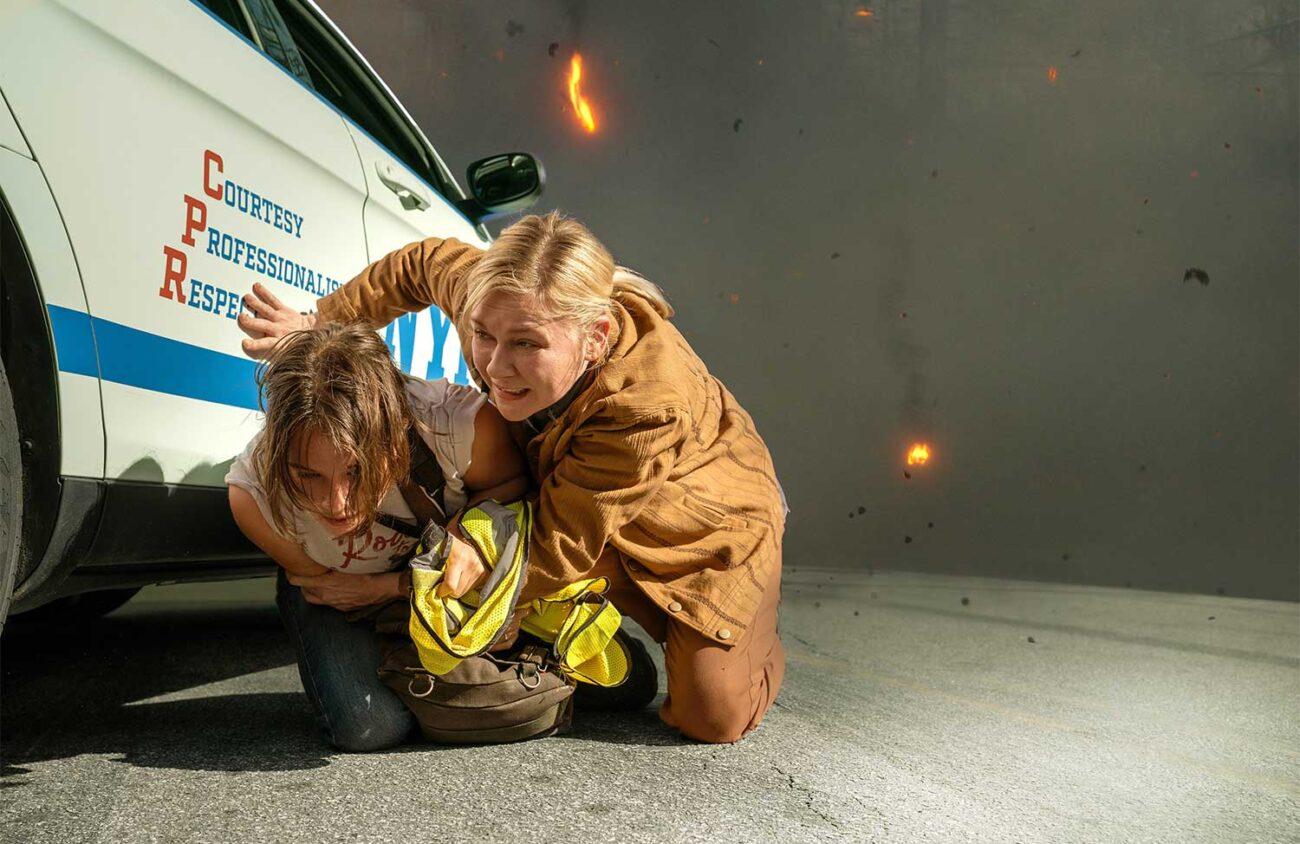The president of the United States is a narcissistic coward who values mere self-preservation over the upholding of any higher principle — you know, like democracy or liberty or any of that stuff. He’s now serving his third term, during which he’s disbanded the FBI. A blithering fool, the man can barely put two sentences together while addressing the growing conflict that is threatening to tear the nation apart.
No, I am not talking about Donald Trump or Joe Biden. I am speaking, of course, about the actor Nick Offerman, who plays the pointedly unnamed president in the widely anticipated new film by writer/director Alex Garland, who most famously brought us the screenplay for the zombie masterpiece 28 Days Later.
Garland’s Civil War, in which civil unrest explodes into widespread warfare across the U.S., enters our fractured social landscape so front-loaded with expectations that it is almost impossible to talk about it as a work of art. Everybody wants answers these days, but this film poses few and answers fewer. It is not about causes but effects. And the effects are hellish.
There have been plenty of civil wars in recent times — in Chad, Congo, Iraq, Somalia, Algeria, Syria — but only when civil war comes to the U.S., if only, for the time being, in the form of a speculative movie, does it get named, bluntly and declaratively, Civil War, as though we alone franchised it.
The movie follows the journey of a clutch of photojournalists — excellently portrayed by Kirsten Dunst, Wagner Moura, Stephen McKinley Henderson and, as the youngster of the group, Cailee Spaeny — who travel from the front lines in Charlottesville to Washington, D.C., where they hope to interview the president before the capitol itself falls.
It is a harrowing, violent, deeply weird journey. Similar to the narrative arc of Saving Private Ryan, the journalists encounter a series of isolated skirmishes — raging pockets of hell, each one distinct in tenor and tone — that scream of the greater catastrophe at hand. Everywhere they go, they encounter indefinable, indecipherable madness.
At one point, interviewing a man engaged in a firefight, they ask who he’s shooting at — as in, which side are you on? The sniper gives them a quizzical look and finally points out that he’s shooting at someone who’s shooting at him.
That’s it: kill or be killed.
Civil War is a very good movie, though the aura surrounding it is certainly a huge part of the fascination it currently holds. I’m not sure I have ever gone into a movie with a greater tension of uncertainty versus expectation, as though the film itself might bring some level of clarity to the chaos of our collapsing empire.
Not 15 minutes into the film, I snapped awake. Oh! I suddenly realized, this is just a movie. More to the point, a war movie — or an anti-war movie, depicting up close and tight the apolitical hell of internecine conflict. The fact that this conflict is happening on U.S. soil is, in one sense, completely arbitrary, though it also points to the audacity of Garland’s vision.
That audacity creates a kind of dislocation and dissociation in the viewer. We’ve seen dozens of war movies, perhaps, but watching one happen in your backyard elicits a very distinct disruption in your brain. It’s like feeling world history smack you in the face, if only as a possibility.
I mean, nobody went into Black Hawk Down hungering for greater clarity on the complex social and political factors fueling the civil war in southern Sudan, and to find out which side was which, and who was to blame. Among other things this film might force you to ask is, why is that?
Because by the time the shooting starts, the moment for politics is over. There are no good guys and bad guys. There are people shooting at each other. There is savagery and fear and bodies blown apart. After the massacre, voices will be compelled to tell us what happened, and start drawing divisions and laying blame again. But at the moment, war and war crime become inseparable terms.
There are a handful of scenes in this movie containing enough raw, explosive power to knock you to your knees. The episode featuring Jesse Plemmons, wearing rose-tinted glasses and toting a machine gun as he interrogates the journalists, is alone worth the price of admission, and the movie’s final moments are so outrageous, so audacious, that I’m still thinking about them days later.
The great achievement of Garland’s film, then, is that he has placed the architectures of a war film not onto a what happened but, instead, a what if? And, all things considered, he has done a pretty straight job of it, which is why the film is so effective, and so disarming. We expect a curative, some kind of medicine for what ails us, and instead he’s slipped us a placebo.
